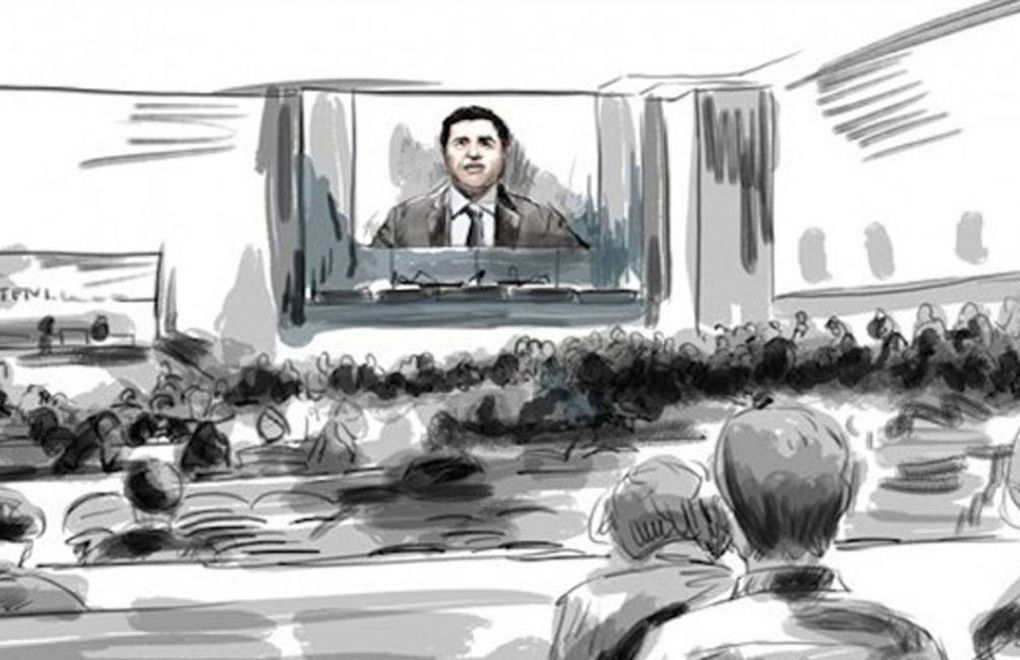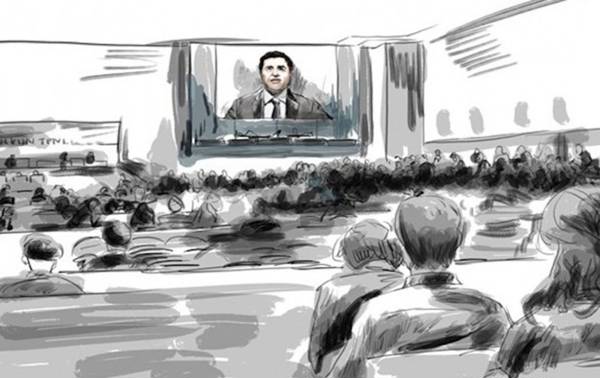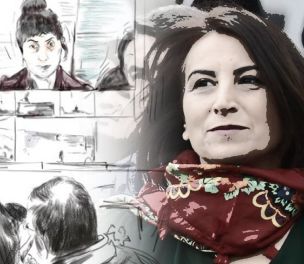Drawing: Ercan Altuntaş
The Kobanî trial recommenced last week, marking the continuation of proceedings after a span of 562 days and multiple sessions since the initial hearing on April 26, 2021. The defendants, all of whom are current and former members of the Peoples' Democratic Party (HDP), face 29 criminal charges, ranging from "attempted murder" to "disseminating terrorist propaganda."
During the session on November 4, the court board decided to release Bircan Yorulmaz and Mesut Bağcık on condition of judicial control, considering that their defense and detention were sufficient.
Yorulmaz emphasized the unlawfulness of the case and left in 'bittersweet joy'. "I was released on the grounds that my interrogation was completed a year and a half ago. This situation proves I spent a year and a half in prison for nothing", the politician and writer for Bianet stated.
The trials, which will continue between November 21 and December 2, has been largely condemned outside Türkiye, with European politicians calling for solidarity with the HDP, considering the case highly politically motivated and 'meddling with democracy.'
'A revenge trial'
This massive legal procedure unfolded after the "Kobanî protests" in October 2014, when the HDP called for demonstrations against a possible massacre in Kobanî, after ISIS laid siege to the Kurdish town in northern Syria. This resulted in thousands of people protesting in Kurdish-majority provinces, as well as in Ankara and İstanbul.
However, clashes ensued, and the demonstrations turned deadly, with 46 people losing their lives, 682 individuals sustaining injuries, and 323 being arrested, according to the Human Rights Association (İHD).
The current case was opened seven years after the incident, with 108 HDP members on trial and 21 remanded in custody because of their alleged involvement in the protests. People indicted include multiple Kurdish political heavyweights such as former HDP co-chairs Figen Yüksekdağ and Selahattin Demirtaş, the former co-chair of the Democratic Regions Party (DBP) Sebahat Tuncel, and HDP Honorary President Ertuğrul Kürkçü.
Thirty-eight accused are facing life sentences, and the prosecution seeks a total of 19,680 years in jail. According to the 3,530-page indictment, all 108 suspects are charged with the same crimes. The prosecution seeks the punishment of all suspects on the charges, such as: "disrupting the unity and territorial integrity of the state," "killing 37 times," "attempted killing 31 times," "burning the flag" and "violating the Law on protecting Atatürk."
The Kobanî case has raised domestic and international controversy and has been called a "revenge trial" by HDP co-chair Mithat Sancar in the first hearing. Throughout the trial, the defense furthermore claimed allegations of manipulating secret witness statements, the alleged assault on Kurdish language and culture, the assertion that the trial is a conspiracy and an act of political retribution against the HDP, and suggested that the actual judges are President Recep Tayyip Erdoğan, MHP Chair Devlet Bahçeli and Minister of Interior Süleyman Soylu.
Closure case
HDP politicians are frequent targets of legal cases, with 4.000 of its members already in prison, according to a 2021 European Commission report, while the party faces the looming threat of being dissolved.
In June 2021, the Constitutional Court accepted an indictment seeking the closure of the HDP and a political ban for around 500 of its members for its alleged connections to the outlawed Kurdistan Workers' Party (PKK). Furthermore, in the past two years, multiple HDP mayors were removed from office, detained, and replaced with trustees.
These legal troubles highlight the fact that despite the HDP's rise as the country's second-largest opposition party and its efforts to establish itself as a more moderate player within Türkiye's political landscape over the past decade, it continues to struggle with the perception of being rooted in anti-systemic origins and plagued by the same issues as its predecessors.
'Survival of the state'
The modern Republic of Türkiye has seen both pro-Islamist right and Kurdish left parties frequently being banned. Secularism and Turkish nationalism are two of the foundational pillars of modern Türkiye, making Islamic and Kurdish revivalism viewed as existential dangers, challenging secularism and Turkish nationalism, respectively.
This has resulted in around 20 political parties being closed, since the enactment of the post-coup 1982 Constitution, with the previous (radical) left Kurdish parties being accused of promoting 'territorial separation based on ethnic and sectarian lines', undermining Türkiye's 'territorial integrity and national unity'.
This 'survival of the state' discourse is prevalent in the Kobanî case. On October 31, 2022, in the 3rd session of the 18th hearing of the Kobanî trail, politician Aynur Aşan brought this up in her defense, which she held in Kurdish.
"My mother tongue has become a disadvantage for me here. Even our efforts to demand the right to education in the mother tongue are reflected as the subject of disintegrating the state, and we are prosecuted for this 'crime'. I made my defense in Kurdish. Did the state fall apart, did the state have any security problems? However, this is reflected as my attempt to break up the state," Aşan stated.
Multiple politicians on trial have used Kurdish in their defense, creating issues from time to time, as Kurdish translators were not brought in or there were problems with the translation, and leading to accusations that people are forced to 'give their defense in Turkish'.
Success transformation
However, what made the HDP appealing was the ability to successfully position itself as the democratic 'party of Türkiye,' with HDP embodying a diverse range of constituents, including people of all backgrounds and ages, genders, as well as marginalized and oppressed groups, instead being solely 'pro-Kurdish'.
Just as the ruling Justice and Development Party (AKP) managed to undergo a transformation that resulted in broader support across different voter groups, it allowed the HDP, under the leadership of Demirtaş, in the June 2015 elections to achieve a groundbreaking accomplishment by surpassing the 10 percent threshold and receiving 13.1 percent of the votes.
The HDP's inclusionary ambitions were also brought up in the defense by former HDP Mardin Deputy Gülser Yıldırım on the 6th session of the 18th hearing period of the Kobanî trial: "If HDP policies are kept alive in this country, the Turkish, Kurdish, Arab, Assyrian or Circassian peoples living in the country will live in peace. In this philosophy, there is no hostility to peoples and beliefs, languages, and cultures, and there is no injustice. There is no hostility towards women and youth. HDP's philosophy sees every person themselves."
Kurdish vote
Due to HDP's successful transformation, it currently holds a significant share of the vote and is considered a decisive force in the upcoming 2023 elections, as polls indicate a close race between rival blocs.
Therefore Demirtaş argued in the November 4 hearing that these lawsuits exist, among others, to influence elections.
"The main purpose of this political activity, which is carried out under the name of a lawsuit, is to isolate the HDP politically by making it seem criminal.
"In this way, it ensures that the AKP-MHP government wins the election again. However, this lawsuit is not their only tactic to achieve this illegitimate goal. The HDP closure case is another political activity carried out for the same purpose," the former co-chair stated.
Precisely six years earlier, on November 4, 2016, Demirtaş was detained based on the October 6-8 Kobanî reports for 'inciting the people to hatred and enmity', after his parliamentary immunity was lifted with a constitutional amendment on May 20, 2016.
The European Court of Human Rights (ECtHR), on November 20, 2018, ordered the termination of the pre-trial detention of Demirtaş. However, the politician is still held in a Type-F prison in Edirne. Besides the ECtHR denouncing Demirtaş detention, it also rejects one of the main pillars of the Kobanî case, namely HDP's tweet on October 6, 2014. According to the court, the HDP's tweet in question is not a call for violence.
Nevertheless, the politician will likely not be released soon, with President Erdoğan responding to the ECtHR's request that "The decision of the ECtHR does not bind us". (WM/VK)







as.jpg)






.jpg)
.jpg)
.jpg)
.jpg)
.jpg)